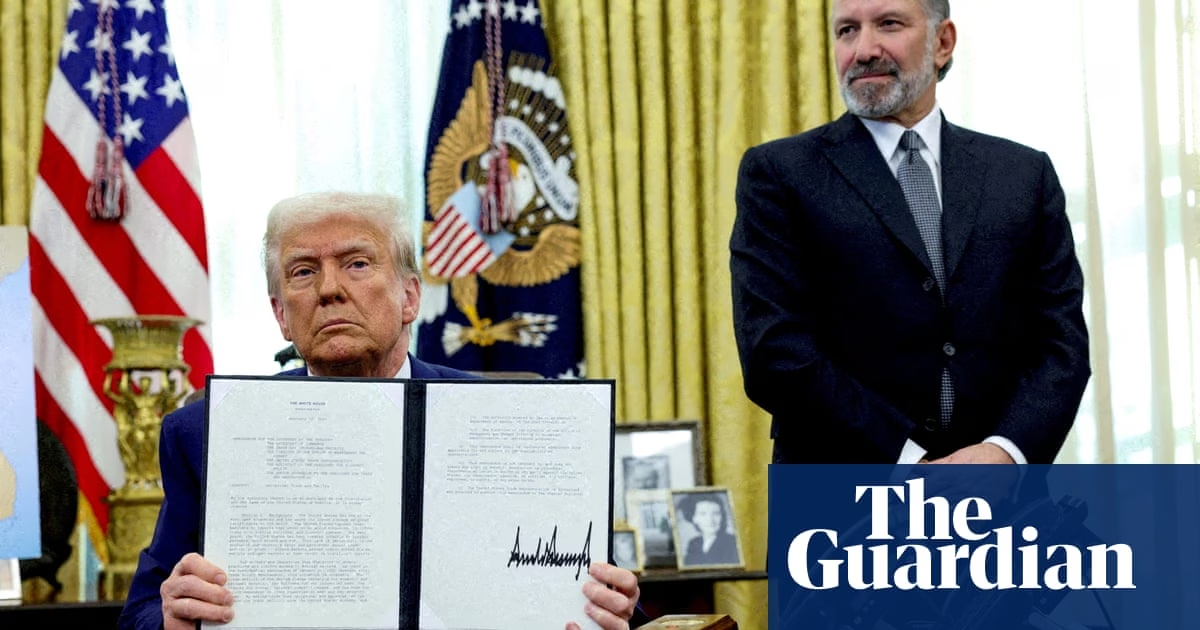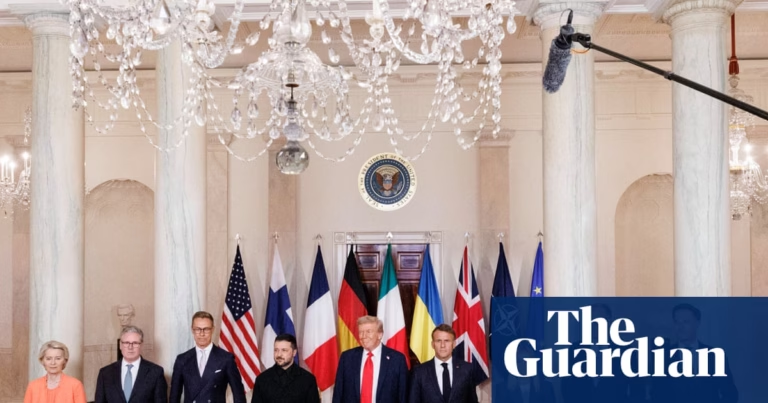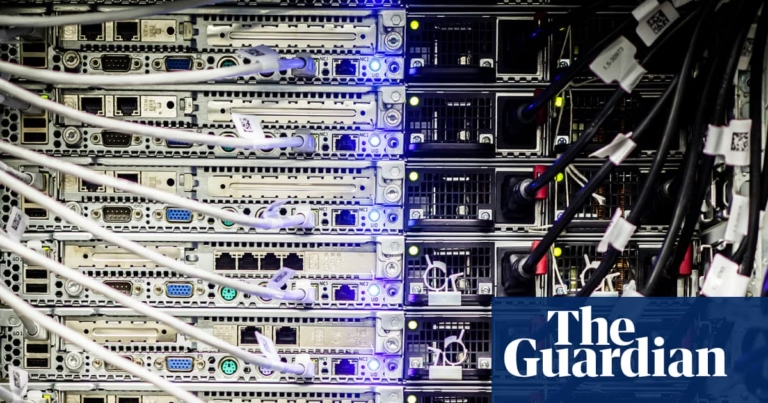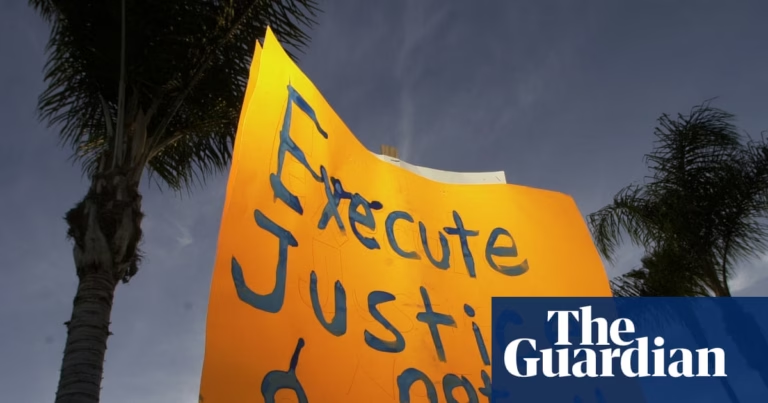<
div>
Good morning. According to Donald Trump, it’s “liberation day”: the advent of a new trade order in which Americans reap the benefit of massive tariffs on imports, and the rest of the world picks up the tab.
Unsurprisingly, the United States’ trading partners tend to take a very different view. And they are doing everything they can to avoid being passive targets for the White House’s carnivorous vision of American exceptionalism.
Trump will announce his plans at 4pm Eastern Time (9pm UK) in the White House’s Rose Garden – but it is still not clear whether a flat rate will be applied globally, or if the charge will vary by country instead. Even at the last minute, countries including the UK are hoping that they might win exceptions; political leaders, and financial markets, are on edge.
For today’s newsletter, Guardian correspondents explain what the tariffs mean around the world – and when you can expect to feel the impact in your pocket. Here are the headlines.
Five big stories
Israel-Gaza war| Israeli Defence Minister Israel Katz announced a major expansion of the military operation in Gaza on Wednesday, saying large areas of the enclave would be seized and added to the security zones of Israel. Follow the latest here.
Israel-Gaza war | Some of the bodies of 15 Palestinian paramedics and rescue workers, killed by Israeli forces and buried in a mass grave in Gaza, were found with their hands or legs tied and had gunshot wounds to the head and chest, according to two eyewitnesses. The accounts add to evidence pointing to a potentially serious war crime on 23 March.
UK news | More than 20 women have contacted police to say they fear they may have been attacked by the serial rapist Zhenhao Zou, with detectives fearing there may be even more victims to come. Zou, 28, was convicted last month of raping three women in London and seven in China between 2019 and 2024.
US politics | Cory Booker, the Democratic US senator from New Jersey, has broken the record for longest speech ever by a lone senator by spending 25 hours and five minutes inveighing against Donald Trump in the chamber. Booker’s speech was intended to highlight the “grave and urgent” danger that Trump poses to democracy.
Cinema | Val Kilmer, the actor best known for his roles in Top Gun, Batman Forever and The Doors, has died at the age of 65. His daughter Mercedes told the New York Times that the cause of death was pneumonia.
In depth: Concessions, retaliation, ‘friendshoring’ – and a new mood of volatility
On Monday, Donald Trump told reporters that he had “settled” on a tariff plan – but according to CNN, White House officials were still presenting him with options on Tuesday. And White House press secretary Karoline Leavitt told reporters that he was “always up” for a phone call or negotiation with foreign leaders hoping to plead their case.
That suggests the satisfaction Trump takes in the power he is able to exert through the United States’ economic might. And whereas in his first term he appeared sensitive to the markets giving his economic policies the thumbs down, he seems genuinely more bullish this time around. Even on the question of whether consumers will pay more, he has so far stuck to the line that the cost will be worth it in the end.
“I couldn’t care less if they raise prices, because people are going to start buying American-made cars,” he said of tariffs on foreign cars on Sunday. And last month, of the tariffs on Canada and Mexico, he said: “We may have, short term, a little pain. People understand that.”
Here’s what that stance means around the world.
UK | What is Downing Street’s strategy?
Last night, Pippa Crerar, Heather Stewart and Richard Partington reported that the UK is ready to offer a significant reduction in its digital services tax, a 2% levy on UK revenues that applies to big American tech firms including Amazon, Meta, Alphabet, eBay, and Apple.
But while business secretary Jonathan Reynolds has insisted that the UK is in “the best possible position of any country to reach an agreement”, Downing Street acknowledges that it is unlikely to get a deal before tariffs come in on a global scale.
“They’ve been aiming at an exemption ever since Trump was inaugurated,” Pippa, the Guardian’s political editor, said – one key reason that Peter Mandelson, a trade expert, was appointed as US ambassador. “Trump has talked about ‘being nice’ to countries that ‘haven’t made a fortune’ out of the US – they hope that’s aimed at us.”
“They remain hopeful he’ll row back quickly because they say a trade deal is ready to go,” she added. “Despite what they say, the trade deal is as much or more about avoiding tariffs as having a brilliant economic relationship. So it’s a defensive move.”
As well as the digital services tax, Trump appears to view VAT as unfair. “I just don’t see how they could change that,” Pippa said. “It’s paid by all companies, not just US ones. And there’s some anger within Labour that the US is trying to interfere with domestic taxation systems.”
That speaks to some of the risks of caving to Trump’s demands. “They’re always thinking of the politics of it,” Pippa said. “But they believe that it’s worth a few bad headlines back home about sucking up to Trump to avoid the potential damage of a full blown trade war with the US which could cost our economy billions.”
Markets | What kind of impact are we seeing?
“We’ve had plenty of volatility already this year, partly because many analysts were complacent about how disruptive Trump would be,” said Graeme Wearden, who runs the Guardian’s daily business liveblog.
“Several Wall Street firms have already cut their end-of-year forecasts for the US stock market in recent weeks, which shows that some of the recent drama is being priced in. But, having seen the US president announce tariffs against Mexico and Canada, and then delay them, investors probably won’t assume the Rose Garden announcement will be the end of the story.”
MCSI’s index of global stocks showed a 4.5% fall in March, the biggest decline since September 2022. But that impact has not been evenly distributed. “There’s been a clear rotation out of US stocks this year, and into Europe,” Graeme said. “While the S&P 500 index of US shares is down 4.5% during 2025, the pan-European Stoxx 600 has jumped 6%.” The FTSE 100 has enjoyed its best quarter since 2022 as traders have looked for alternatives to US firms.
If you’re looking for other signs that this is a nervous moment, the Cboe Volatility Index (Wall Street’s “fear gauge”), has climbed by a third in the last week – and is up 50% on a year ago. That is “a sign that investors expect volatile times”, Graeme said. But he added: “It was three times higher during the 2008 financial crisis, showing that a) investors aren’t in a full-blown panic, and b) there’s room for more volatility.”
World | How are other countries responding?
The UK is not the only country to seek carve-outs from Trump’s threatened universal tariffs: Japan, for example, has tried to persuade the US its manufacturers should be exempted from the 25% car tariff, and South Korea has sought an exemption from steel and aluminium exports.
But the wider pattern is of major economic counterparts seeking to respond in kind. “Certainly the EU is expected to retaliate, and we’ve already seen Canada, for instance, hit back,” said economics editor Heather Stewart. “They’re most likely to try and pick on specific products that hit the US without screwing up their own supply chains too much … Retaliation will tend to make the economic impact of tariffs worse; but politically, it’s understandable that countries want to look tough.”
The other major plank of the global response has been an acceleration in moves towards “friendshoring” – the strategy of reorienting trade policies towards trusted allies with a more reliable approach. China, Japan and South Korea are holding talks over a new free trade deal, for example.
“It was already happening to some extent,” Heather said, partly because of “renewed awareness of extended supply chains that came with Covid and Russia’s invasion of Ukraine. But I would definitely expect more deals that exclude the US.”
Cost of living | When am I going to start feeling the impact?
It’s still too early for the specific costs attached to tariffs to be felt in a major way by consumers – but “the price impact could already be beginning”, economics correspondent Richard Partington said. “Some economists reckon firms will raise their prices under the cover of tariffs, with the assumption that consumers think prices will rise – even if tariffs on those goods are never actually introduced.”
after newsletter promotion
<
p class=”dcr-16w5gq9″>While that is hard to quantify, there is evidence from the US during Trump’s first term – when the cost of clothes dryers went up because of a tariff on imported washing machines – that it is a plausible path. Something similar might happen in the UK on goods sold from the US using components sourced from overseas, Richard said – but it’s also possible that “trade reallocation”, where
Source: https://www.theguardian.com/world/2025/apr/02/first-edition-tariffs-us-canada-europe







